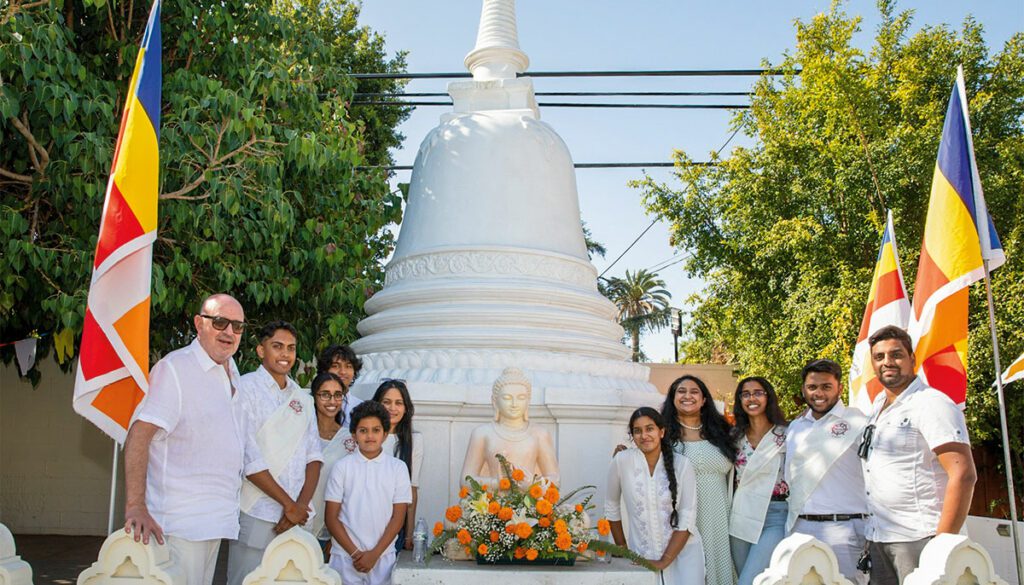I purchased a T-shirt that claims, “Aunty’s Worst Nightmare.” It’s an correct description of me within the eyes of many conventional Sri Lankan aunties. I’ll by no means be an “acceptable” Sri Lankan American Buddhist. I’m single and childfree by alternative, I’m loud, I curse, I take up area (metaphorically, bodily, and conversationally), and I’m fats. Worst of all, I’m completely content material with it!
As a thirty-seven-year-old girl, I’m in an odd transitional section in terms of the Sri Lankan American group. For folks of their twenties and thirties, I’m “akki,” or “older sister.” For folks of their forties, I’m “nangi,” or “youthful sister.” However for anybody youthful than that, I’ve turn out to be Schrodinger’s aunty, concurrently aunty and not aunty.
A number of years in the past, whereas speaking to a nine-year-old at my temple, I requested who her mother and father have been. She then pulled her mom’s sleeve, pointed at me, and mentioned, “That aunty desires to speak to you!”
Instantly, her mom’s face turned bitter, and she or he chastised the kid: “That’s not an aunty, that’s Mihiri Akki!” I burst out laughing. After I found the mother was solely 5 years older than me, I instructed the child, “It completely is smart so that you can name me ‘aunty.’ No worries!” The mother appeared aghast. As an grownup immigrant born in Sri Lanka, she couldn’t conceive of somebody with my Valley Lady accent being “aunty.”
As I get older, my relationship with each youthful generations and my temple is altering. This uncertainty in being Schrodinger’s aunty displays the uncertainties for Asian American Buddhist establishments dealing with generational shifts.
In my function at Lion’s Roar, I’ve met with totally different Asian American Buddhist communities. One subject that just about at all times comes up is the query of generational continuity: How can we preserve sangha members born and/or raised within the U.S. concerned as they get older?
My temple, Dharma Vijaya Buddhist Vihara in Los Angeles, California, has efficiently stored a number of generations of Sri Lankan American Buddhists engaged with our group. Whereas younger adults not attend Sunday college weekly, they keep concerned financially by being month-to-month donors, attending non secular occasions and festivals, and taking management roles. For instance, the 2022 Kathina celebrations have been completely organized and funded by former Dharma Vijaya Sunday college college students, now of their twenties, thirties, and forties.

What does this imply for Buddhism, the place lineage is so very important, that Asian American Gen X, millennial, and Gen Z people born and/or raised within the U.S. at the moment are aunties? How are we passing on our cultural and non secular traditions in distinctive methods? What does it imply to be an Asian American Buddhist aunty shaping future generations? Nicely, I’m the aunty now. I get to determine what it means.
For me, auntyhood is an method to your relationship with others: organic and nonbiological household, communities, and youthful generations. Principally, auntyhood is one thing that you simply do, so anybody, no matter gender, will be an aunty. Doing auntyhood—or “auntying”—means accepting, shifting ahead, and appearing with the information that you’re now, on this second, an ancestor. Which begs the query, what sort of ancestor do you need to be? What reminiscences and legacies do you need to depart behind?
Listed here are 4 suggestions for doing Buddhist auntyhood.
Handle the Sensible Wants of Your Neighborhood
On the partitions at Dharma Vijaya are two typed lists of donors: one for individuals who repeatedly make lunch for the monks, and the opposite for individuals who make month-to-month monetary contributions to the temple. The names on the meals donation checklist are all first-generation immigrants, whereas the month-to-month monetary donors are a mixture of first- and second-generation immigrants. In different phrases, those that have been born or grew up within the U.S. aren’t making meals for the monks, however they’re nonetheless supporting the establishment.
Being concerned can merely imply serving to your temple preserve the lights on by contributing to month-to-month payments. A Buddhist aunty donates what they’ll both regularly, or solely on pageant days or holidays. Different methods Buddhist aunties can tangibly assist their temple is by shopping for and donating sensible issues in bulk, resembling drinks and disposable dinnerware.
Use Your Talents and Experience to Enhance Your Neighborhood
Along with financially supporting my temple, I give my time and power to my group. I take advantage of my educating expertise and Buddhist information to guide classes a couple of instances a yr for Sunday college, and I take advantage of my expertise in greater training to assist Sunday college teenagers with faculty purposes at no cost.
All of us have our strengths, so use the stuff you’re good at to become involved. Should you’re computer-savvy, assist with graphic design or organising web sites and social media accounts to your temple. Should you’re a physician, lead a workshop on coronary heart illness, diabetes, or a selected sickness that disproportionately impacts your group. Should you’re expert at a sport, begin a workforce for the children in your temple. Should you’re an incredible author, musician, or artist, educate a few of what you’ve discovered to younger folks.
In volunteering your experience, you’ll be able to contribute to the temple group, make a distinction, and turn out to be a mentor and function mannequin for youthful generations.
Perhaps you don’t suppose you will have any related skills (which I don’t suppose is true!). In that case, volunteer your time by serving to to arrange earlier than pageant days. Or simply choose up the cellphone and ask the temple what you are able to do to assist!
Develop a Relationship with Clergy
Growing a working relationship with monastics permits you to each perceive your group’s dynamics higher and have a say in how your group operates. In doing so, you’re constructing one thing to your group now and for future generations.
You’ll be able to information monks on their method to youthful generations. In case you have children, supply recommendation from your personal experiences as a mother or father. Since I’m childfree, I supply my understanding of being born and raised in america. You’ll be able to encourage the clergy to make diversifications to ceremonies and traditions in order that Buddhist practices are relevant and related to our lives within the U.S.
I like the abbot of my temple, Bhante Walpola Piyananda. He offers younger folks management roles within the temple, purposefully abandons inflexible requirements, and has intentionally horizontalized/equalized the connection between laity and monastics. We’ve had many conversations about temple dynamics and youthful generations.
Don’t be afraid to disagree with monks! Auntyhood brings with it a sure degree of energy, so that is the time to flex it! Whereas I respect monks, I’m not overly deferential. I converse plainly and—if essential—bluntly, particularly when monks have unrealistic expectations for teenagers rising up within the U.S.
I understand this may increasingly not work for everybody. I’ve seen in different Asian Buddhist traditions that entry to monastics will be restricted, particularly when you’re a girl. In my expertise, Sri Lankan Buddhist monks at California temples admire that I need to be concerned and are keen to hearken to my concepts, even when we disagree.
Rethink and Remake Buddhist Traditions
Being concerned in your group means rethinking cultural and non secular values and remaking them to work throughout the American context.
After I go to different Sri Lankan Theravada areas within the U.S., I’m shocked at how fiercely hierarchies, sure traditions, and strict requirements of habits are enforced by immigrant aunties and uncles. They method their children’ relationship with the temple as in the event that they have been Sri Lankan children attending a temple in Sri Lanka. Consequently, these children see their temple as a inflexible, restrictive place the place they’re scolded for breaking guidelines they don’t perceive. When these children turn out to be adults, they cease coming to the temple.
A part of my work as a Buddhist aunty is stating to those mother and father that their children are Sri Lankan American, and their temple is in America. Doing issues resembling requiring children to memorize Pali chants with out educating their that means is nonsensical for teenagers rising up within the U.S. In distinction, incorporating English translations of Pali chants into our temple practices permits younger folks to know and admire their traditions.
Although I’ve absolutely leaned into my Buddhist auntyhood, I don’t have the solutions to the issue of generational continuity that Asian American Buddhist establishments are dealing with. However I’ve seen that when temples encourage youthful generations to really feel a way of possession over their temple, they’re extra keen to take part and contribute as adults.
In the end, being a Buddhist aunty is about feeling comfy and proudly owning your belonging in your group. The Buddhism my mates and I grew up practising is totally different from the Buddhism in Sri Lanka. Regardless, we name it “our heritage.” A part of being in diaspora is attending to determine for ourselves what “heritage” and “custom” imply.These of us who grew up within the U.S. neglect that our temples really are our areas. We’ve been a part of these establishments for years and many years longer than latest immigrants. So, take possession of your house in your group! Embrace the facility of being a Buddhist aunty, go forth, and make a distinction!
This text is from the March 2024 subject of Lion’s Roar journal.


